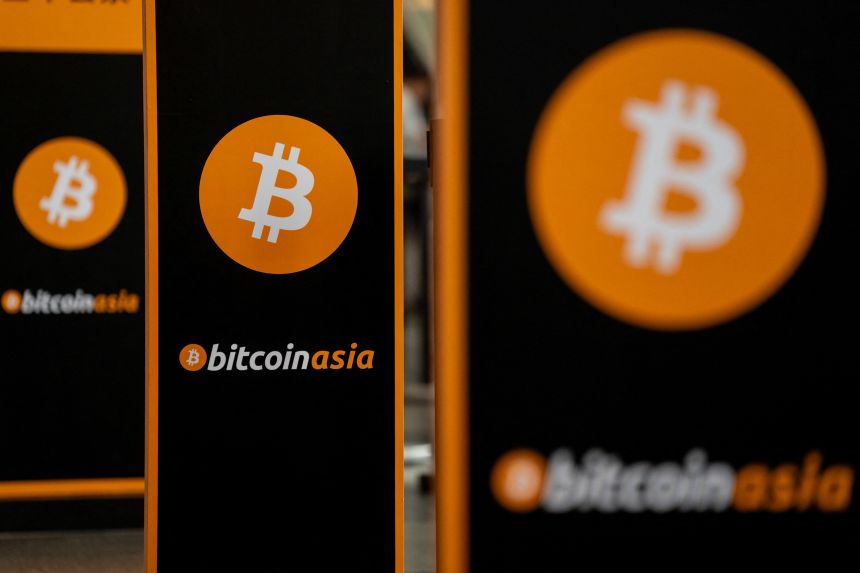Hong Kong
—
Hong Kong is eager to embrace cryptocurrency.
Crypto exchange shops now greet customers in shopping malls. Hundreds of crypto ATMs have sprung up along the city’s busy streets. And last week, Eric Trump – son of United States President Donald Trump and now a central figure in the family’s crypto empire – was featured at the Bitcoin Asia summit in the global financial center.
Hong Kong has ambitious plans to tap into the $3.8 trillion digital assets market with new legislation rolled out last month that will allow licensed businesses to issue stablecoin, a type of cryptocurrency pegged to real-world assets like the US dollar. As mainland China has banned crypto trading and mining, the success of the stablecoin ecosystem in the city, as the country’s testing ground, could pave the way for an offshore yuan-backed token and further adoption of the technology eventually.
Experts have hailed the regulation as the first-of-its-kind in Asia, positioning the city almost on par with the US Genius Act, which has since galvanized a stablecoin frenzy. But the initial enthusiasm for the city’s stablecoin drive has been tempered by a cautious regulatory approach, keeping it from replicating the breakneck growth seen in the United States.
Some potential issuers have expressed frustration at the government’s stringent requirements, like huge liquid reserve and client identity verification for anti-money laundering, which raises compliance costs, according to two industry sources familiar with relevant discussions. A few of these potential issuers who earlier expressed strong interest have now taken a wait-and-see approach, as they are hesitant to apply in the first licensing round, one of the sources added.
“They want to see early players go through the process successfully before moving forward,” the person said.
Setting a high bar for stablecoin issuers, the city’s de facto central bank, the Hong Kong Monetary Authority (HKMA) said it would limit the licenses to only a “handful” of applicants in the first round of issuance early next year.
Hong Kong set its eyes on courting cryptocurrency business in 2022 with its first policy statement on digital assets. An update in June declared its “commitment to establishing Hong Kong as a premier global hub for digital assets.”
Beyond a bid to strengthen its position as an international financial hub, Hong Kong’s push into stablecoins underscores China’s growing interest in the sector. A thaw in Beijing’s rhetoric in recent months reflects its bid to internationalize the yuan amid concerns that US dollar-backed stablecoins could further the greenback’s hegemony. But its tight capital controls may prevent it from adopting the technology just yet.
Dozens of firms have already expressed interest in applying for licenses to issue stablecoins, including major banks and tech companies such as Bank of China, China’s ecommerce giant JD.com and Alibaba affiliate Ant Group.
Yat Siu, executive chairman and founder of Web3 video gaming company Animoca Brands, described Hong Kong’s stablecoin regime as the most advanced in Asia.
“It puts it ahead of almost any other Asian jurisdiction, because no other Asian jurisdiction has a stablecoin law that allows you to license it from central bank,” he said. “It’s going to be a blueprint for others.”

Last month, Siu’s company formed a joint venture, Anchorpoint, along with Standard Chartered bank and Hong Kong Telecom to apply for a stablecoin license. The trio has also participated in the city’s stablecoin “sandbox” pilot that began last year.
Siu noted that one key restriction posed by the stablecoin rules is the requirement for issuers to back their tokens fully with “very liquid treasuries.” The HKMA mandates that issuers maintain at least HK$25 million ($3.2 million) in capital, with reserves held in high-quality assets in segregated accounts and available for prompt redemption.
Experts say these measures help ensure stability and protect holders, but also effectively shut out smaller players.
Esme Pau, head of capital markets at blockchain security firm Certik, said the top hurdle facing stablecoin issuers is the “stringent safeguards” that contribute to a steep cost of entry.
Principal among them is the Know-Your-Customer rules designed to curb money laundering, which drive up compliance expenses significantly, she explained. In one example, the HKMA expects stablecoin issuers to conduct rigorous identity checks on customers for transactions of HK$8,000 ($1,027) or above.
“Such obligations create a challenging calculus: obtaining a license under the existing regime may limit near-term profitability, which explains fading market enthusiasm,” Pau said, adding that the high bar for issuers, however, produce a more resilient and trusted stablecoin ecosystem.
Still, she struck a hopeful note, expecting the regulatory regime to evolve.
“HKMA is adopting a prudent stance at launch. If implementation proceeds smoothly, requirements are likely to be recalibrated in a more commercially viable direction over time,” she said.
But with the requirements resembling those imposed on banks, experts said Hong Kong regulators are likely to award the first batch of licenses to established financial institutions. That means the initial use will likely be limited to business-to-business scenarios rather than retail investors.
“Entry is limited to large, well-capitalized issuers with strong compliance, operational resilience, and clear economic use cases – underscoring HKMA’s high bar for sustainable, utility-driven stablecoin models,” Morgan Stanley’s China economist Jenny Zheng wrote in a July report.
At last week’s Bitcoin Asia summit in Hong Kong, over 17,000 local and international attendees flocked to talks by industry experts. Booths showcased technologies and services ranging from crypto mining machines and bitcoin treasury solutions to trading platforms and wallets.
Despite China’s restrictions on most crypto activities, the country boasts more crypto users than the US, with over 78 million owners, according to digital payment firm Triple A’s 2023 estimate.
“China is one of the biggest bitcoin mining locations in the world. They have one of the biggest user bases of bitcoin in the world. Their citizens own a huge percentage of bitcoin. They’re a bitcoin superpower,” bitcoin investor and evangelist David Bailey told CNN’s Kristie Lu Stout.
The annual bitcoin gathering came amid Beijing’s softening stance on crypto and stablecoins. At China’s top financial forum in June, central bank governor Pan Gongsheng highlighted stablecoins’ role in facilitating cross-border payments at a faster pace, saying they have “fundamentally reshaped the traditional financial landscape.
Part of the shift reflects Beijing’s recognition of US dollar’s growing digital influence, said Jeff Wen, co-founder and chief business officer of Hayek Technology, a fintech firm based in Taiwan.
“After the passage of Genius Act, the use of stablecoins has extended beyond American borders, with other countries adopting similar mechanisms that, in effect, reinforce US dollar dominance,” he said.

To boost the Chinese currency’s digital presence, JD.com and Ant Group have urged China’s central bank to authorize the launch of offshore yuan-backed stablecoins in Hong Kong to counter the dominance of US dollar-pegged cryptocurrencies, Reuters reported in June, citing anonymous sources.
Experts, however, said yuan-backed stablecoins are unlikely to emerge anytime soon — at least not until Hong Kong dollar–pegged tokens have proven successful.
“I think when they look at Hong Kong, they see an opportunity to trial and experiment some of the ideas they might want to bring to mainland China. And so, this is just a perfect laboratory to trial some of these bleeding edge technologies,” Bailey said.
For now, much depends on how the first batch of licenses is rolled out and the stablecoins are brought into circulation.
Emil Chan, co-chair at industry group Hong Kong Digital Finance Association, said the broader challenge to the city’s crypto hub ambitions is the conservative culture of its finance industry because of its long-standing success.
Chan, who also teaches corporate executives in the city’s universities, noted that few of these professionals have hands-on experience with digital wallets for cryptocurrency.
Hong Kong’s legacy as a leader in traditional finance, he said, is “restricting us from opening up our mind and embracing new products,” he said.








